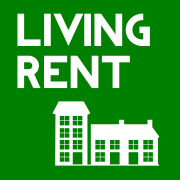Living Rent calls for tourist tax be spent on relieving the housing crisis

Members of Living Rent, Scotland’s tenants’ union, are demanding that the City of Edinburgh Council commit to spending more money of the tourist tax revenue on social housing.
The levy, introduced in legislation by the Scottish Government giving the councils to charge visitors for overnight stays, could raise more than £50 million annually in Edinburgh alone through a 5% tax.
In May of 2023, the Scottish Government announced the development of a visitor levy, or tourist tax. Councils will be able to generate funds from tourism by taxing overnight accommodation, once they have consulted local communities and businesses. This plan is part of a wider commitment of the Scottish Government to hand more power to local councils.
So far, the City of Edinburgh Council has committed to £5m from the visitor levy being used to borrow a further £150m to build new council and affordable homes, however, Living Rent says this does not go far enough.
The tenants’ union is calling for the council to commit to spending a minimum of £9.1m a year to allow for borrowing of up to a minimum of £246m.
They say this is based on the number of homes needed to stop the recourse to B&B as homelessness accommodation. This would also increase the number of B&Bs and hotel rooms available for visitors, and in turn, increase the amount of money generated via the levy.
However, Living Rent argues that though £9.1m would be a great step forward, it is still insufficient to future-proof the city. Much greater funding is needed to ensure adequate housing, support people who are homeless, end temporary accommodation use and combat rising contributions costs.
Living Rent argues that by housing people in long-term council housing, this would also save the council long-term costs. They say that council figures show that after re-homing people in 500 previously void properties this has saved the council circa £10m in temporary accommodation costs, brought in £2.5m in rental income and prevented approximately 400 homelessness events.
Living Rent says that the revenue this levy will raise represents an opportunity to repair and retrofit existing council housing, to build more council housing and to alleviate the burden of rent. It will also provide much needed housing for tourism workers, who are the lowest paid and struggle to find suitable accommodation in the city.
Eilidh Keay, chair of Living Rent Edinburgh, said: “The money generated on the visitor levy should go into improving the lives of people who live and work in Edinburgh. It is us who power and sustain the visitor economy, but seldom feel the positive impacts of money generated.
“Instead we often feel the adverse impacts of over-tourism and festivals on our housing and daily lives. Too often companies promoting tourism get a free pass to do what they want to our city, at the expense of the people who live here.
“Enough is enough, after declaring a housing emergency, it is time that this council takes proper action to ensure that the city does not continue to be the playground of the rich and a site for industry to continue to extract eye-watering profits from. This has to mean committing proper money to delivering council homes for Edinburgh so that everyone has access to a safe, secure, affordable home.”
Bryan Simpson, lead for Unite Hospitality, added: “As the biggest union representing hospitality and tourism workers in Edinburgh and across the country, we believe that the Edinburgh Visitor Levy has the potential to positively transform a sector which has proven vital for the economy of the Capital but only if it is maximised and spent wisely.
“We support Living Rent calls for a maximum 8% levy which, apart from being in line with other major capitals, is needed to raise the £hundreds of millions necessary to invest in homes and better jobs for the thousands of workers that make the dapital’s nightlife one of the most thriving and profitable in Europe. In practice, this means much more investment in social housing - both in terms of new building and refurbishment - as well as better investment via Heritage, Culture and Events targeted at improving pay and conditions for Edinburgh hospitality and tourism workers who remain some of the lowest paid in the Scottish economy.
“We would also like to see some of the money raised go towards paid (or heavily subsidised) transport home for late night tourism workers as part of our Get me Home Safely campaign, which is now supported by ECC.”
Alison Murphy, local association secretary, Edinburgh EIS, said: “Edinburgh EIS fully supports Living Rent’s demand that money from the Visitor Levy is, primarily, used to improve the lives of the people of Edinburgh. It is Edinburgh’s residents who make the city the wonderful, vibrant city it is – furthermore, they are the people who provide the workforce necessary to support the tourism industry.
“Teachers across the city see the awful impacts that insecure housing has on children – if a significant proportion of the money raised is used to help tackle the housing emergency, then we should see children better able to engage in learning, and more likely to go on to positive destinations. Indeed, we would like to see money raised used to support a range of initiatives that make it more likely that children can be successful in school, and supported into high-quality careers in tourism - something that will have long-term benefits for all.”
Brian Robertson, Unite City of Edinburgh Council Branch, said: “Bringing in a Visitor Levy should be a positive step for Edinburgh. The additional monies raised must be used for the benefit of the population. They must be used to enhance the services the council provides to its citizens and improve terms and conditions of the workers who deliver those services. The Scottish Government must not see these additional monies as a means of evading its funding obligations to the City of Edinburgh.”








